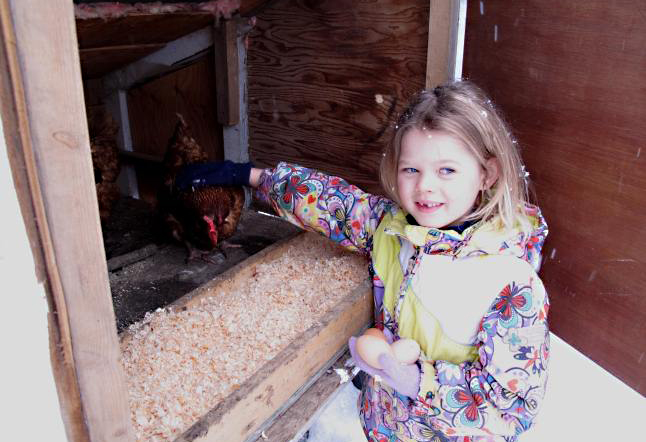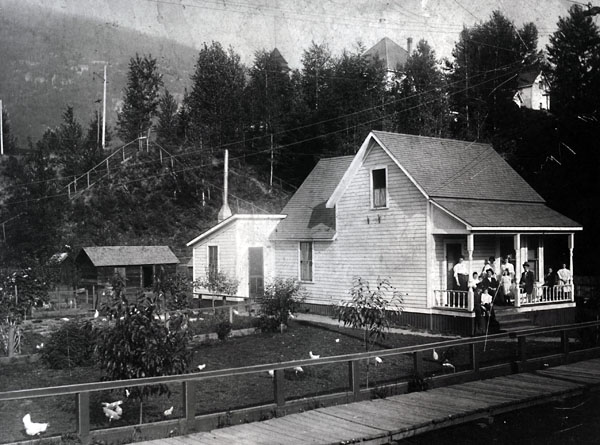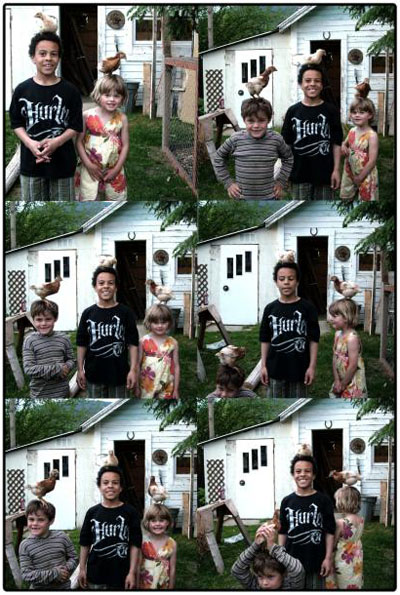
By Laura Stovel
Seven year old Alexandra Luxmore opens the latch of her family’s chicken coop to reveal a brown hen standing over three large eggs nestled in a bed of wood shavings. “Hello Lightning,” she says, gently stroking the hen’s soft feathers. The hen stands contentedly, only moving away when Alexandra removes the eggs. In the meantime another brown hen, Rainbow Dove, comes to investigate and allows herself to be stroked for a while.
Alexandra carefully takes the eggs into the house and hands them to her father, Rory Luxmore, who washes them immediately. They will be ready for a hearty breakfast or to add to some fresh baking. Growing up in a household of gardeners and, now, chicken keepers, Alexandra and her brother, Nelson, know where much of their food comes from. The only problem is, those chickens – those ‘pets with benefits’ – are illegal.

A brief history
Revelstoke has had a long history of raising chickens. According to Cathy English, curator of the Revelstoke Museum and Archives, Revelstoke had a Poultry and Pet Stock Association, which began around 1911. Many people had poultry and the city had an annual poultry show that even attracted people from outside town.
In ‘Little Italy,’ in the Southside area, houses were often built close to the street to maximize the space in the back for gardens, poultry and other livestock, English said.
In the mid-1970s the laws changed in what was, at the time, the City of Revelstoke. According to City Planner John Guenther, when the zoning bylaws were brought in around 1974-75, poultry and livestock were prohibited in urban zones. Those who had chickens at the time were grandfathered in but they could not increase the number of chickens they raised and they could not move to another urban area with their chickens.
Still, some areas within the current boundaries of Revelstoke allow poultry and livestock. All rural residence (RR zones) areas except those zoned RR04 allow livestock, Guenther said. That means chickens can be raised in some parts of Arrow Heights and CPR Hill (Clearview Heights). For exact locations you can visit the planning department at City Hall.

Looking forward
In June 2010, the City of Vancouver enacted legislation permitting backyard chickens. Several other cities, including Victoria, and even New York City also permit poultry, though Victoria does not allow roosters, only hens. And although Nelson doesn’t yet allow backyard hens, it’s an issue before that city’s Council but no decision has yet been made. Given current concerns about the cost and quality of food, is it time for Revelstoke to also consider legalizing back yard chickens in the downtown area?
Sarah Newton, Alexandra’s mother, thinks so. “We want our children to be in touch with their food sources,” she said. “Rory and I are very impressed with the energy return on investment when we raise chickens.” Each chick costs $1.50. “They eat waste from our house, their waste is good for my garden, and every day they produce a perfect protein package – an egg – for our family to eat.”
The Newton/Luxmore household has three hens and each hen produces an egg a day, though a little less in winter. They originated in a factory farm in Edmonton so Newton jokingly calls them “rescue chickens.”
Newton highlights several misconceptions about chickens and egg production. The first is that roosters are required to produce eggs. They are not. “In fact you don’t want a rooster because roosters fertilize eggs and you want unfertilized eggs,” she said. Also, without roosters, neighbours are unlikely to protest due to noise. While roosters are famous for their crowing, hens produce only “a pleasant clucking sound.”
The second misconception, Newton says, is that chickens are smelly. This is only the case if owners don’t clean the chicken coop, just like cleaning up after a dog or a cat. If owners clean the coop once a week it will not smell. As for the workload in maintaining a clean chicken coop, Newton says it is much less than having a dog. Owners can leave for up to a week if they have a proper feeding system, as long as someone is able to collect the eggs.
Third, some people might think that chickens cannot be kept outside in the winter. Newton and Luxmore’s chicken coop is in a tree well so the snow load is less. “We only use an old-fashioned light bulb for heat,” she said. “Chickens need 16 hours of light a day to lay eggs so we have a light bulb on a timer.”
There is also a concern that chickens might attract bears. Indeed chickens are a bear attractant, said Bear Aware coordinator, Jeanette Vickers, but there are ways of managing this. The first step is to keep the coop clean. Bear Aware staff also help residents find solutions to bear problems. In more rural areas, putting up electric fencing to detract bears is an option. The Bear Aware program organized a workshop on electric fencing last autumn and is planning another one this spring.
Another concern might be whether the City has the capacity to deal with chickens that are not being properly cared for. Veterinarian Llewanda Halldorson of the Revelstoke and District Humane Society said she likes the idea of people having chickens as long as they are properly fed and watered and the coops are cleaned and ventilated as chickens are susceptible to respiratory illnesses. “At this point, chickens have never been an issue,” she said but noted that the Humane Society is not set up to cope with chickens. If more people were raising poultry, the capacity of the Humane Society to care for neglected chickens might have to be revisited.
It is an ‘open secret’ that several people in downtown Revelstoke have chickens. Currently the City only responds if someone complains. However because having chickens in these zones is not permitted, all it takes is one complaint to force owners to get rid of their chickens. Luxmore and Newton are careful to consult their neighbours on an ongoing basis to ensure that there will be no problems, Luxmore said.
The City is currently drafting a new Unified Development Bylaw. Although the prospect of urban poultry is currently not mentioned, there will be an opportunity to comment on the draft bylaw later this spring. Maybe it is time to bring up the subject of legalizing urban chickens, ensuring that more downtown families can enjoy ‘pets with benefits.’



